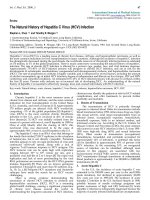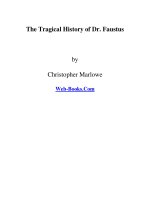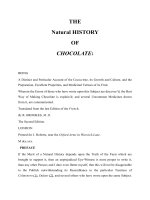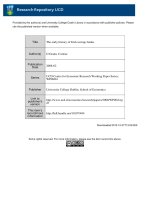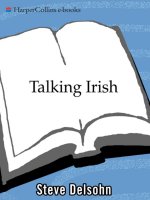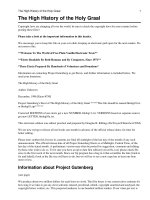The Tragical History of Dr. Faustus
Bạn đang xem bản rút gọn của tài liệu. Xem và tải ngay bản đầy đủ của tài liệu tại đây (67.4 KB, 11 trang )
The Tragical History of Dr. Faustus
by
Christopher Marlowe
Web-Books.Com
The Tragical History of Dr. Faustus
Dramatis Personae............................................................................................................ 3
The Tragical History of Doctor Faustus......................................................................... 4
Notes................................................................................................................................. 48
Dramatis Personae
THE POPE.
CARDINAL OF LORRAIN.
THE EMPEROR OF GERMANY.
DUKE OF VANHOLT.
FAUSTUS.
VALDES and CORNELIUS. friends to FAUSTUS.
WAGNER, servant to FAUSTUS.
Clown.
ROBIN.
RALPH.
Vintner.
Horse-courser.
A Knight.
An Old Man.
Scholars, Friars, and Attendants.
DUCHESS OF VANHOLT
LUCIFER.
BELZEBUB.
MEPHISTOPHILIS.
Good Angel.
Evil Angel.
The Seven Deadly Sins.
Devils.
Spirits in the shapes of ALEXANDER THE GREAT, of his Paramour and of HELEN.
Chorus.
The Tragical History of Doctor Faustus
Enter CHORUS.
CHORUS. Not marching now in fields of Thrasymene,
Where Mars did mate[1] the Carthaginians;
Nor sporting in the dalliance of love,
In courts of kings where state is overturn'd;
Nor in the pomp of proud audacious deeds,
Intends our Muse to vaunt[2] her[3] heavenly verse:
Only this, gentlemen,--we must perform
The form of Faustus' fortunes, good or bad:
To patient judgments we appeal our plaud,
And speak for Faustus in his infancy.
Now is he born, his parents base of stock,
In Germany, within a town call'd Rhodes:
Of riper years, to Wertenberg he went,
Whereas[4] his kinsmen chiefly brought him up.
So soon he profits in divinity,
The fruitful plot of scholarism grac'd,
That shortly he was grac'd with doctor's name,
Excelling all whose sweet delight disputes
In heavenly matters of theology;
Till swoln with cunning,[5] of a self-conceit,
His waxen wings did mount above his reach,
And, melting, heavens conspir'd his overthrow;
For, falling to a devilish exercise,
And glutted now[6] with learning's golden gifts,
He surfeits upon cursed necromancy;
Nothing so sweet as magic is to him,
Which he prefers before his chiefest bliss:
And this the man that in his study sits.
[Exit.]
FAUSTUS discovered in his study.[7]
FAUSTUS. Settle thy studies, Faustus, and begin
To sound the depth of that thou wilt profess:
Having commenc'd, be a divine in shew,
Yet level at the end of every art,
And live and die in Aristotle's works.
Sweet Analytics, 'tis thou[8] hast ravish'd me!
Bene disserere est finis logices.
Is, to dispute well, logic's chiefest end?
Affords this art no greater miracle?
Then read no more; thou hast attain'd that[9] end:
A greater subject fitteth Faustus' wit:
Bid Economy[10] farewell, and[11] Galen come,
Seeing, Ubi desinit philosophus, ibi incipit medicus:
Be a physician, Faustus; heap up gold,
And be eterniz'd for some wondrous cure:
Summum bonum medicinae sanitas,
The end of physic is our body's health.
Why, Faustus, hast thou not attain'd that end?
Is not thy common talk found aphorisms?
Are not thy bills hung up as monuments,
Whereby whole cities have escap'd the plague,
And thousand desperate maladies been eas'd?
Yet art thou still but Faustus, and a man.
Couldst[12] thou make men[13] to live eternally,
Or, being dead, raise them to life again,
Then this profession were to be esteem'd.
Physic, farewell! Where is Justinian?
[Reads.]
Si una eademque res legatur[14] duobus, alter rem,
alter valorem rei, &c.
A pretty case of paltry legacies!
[Reads.]
Exhoereditare filium non potest pater, nisi, &c.[15]
Such is the subject of the institute,
And universal body of the law:[16]
This[17] study fits a mercenary drudge,
Who aims at nothing but external trash;
Too servile[18] and illiberal for me.
When all is done, divinity is best:
Jerome's Bible, Faustus; view it well.
[Reads.]
Stipendium peccati mors est.
Ha!
Stipendium, &c.
The reward of sin is death: that's hard.
[Reads.]
Si peccasse negamus, fallimur, et nulla est in nobis veritas;
